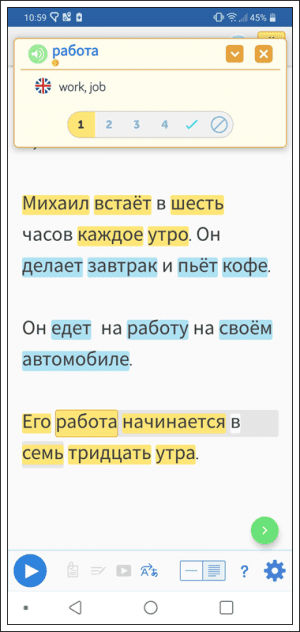Russian Food Bloggers: Learn Russian by learning about Food
There are so many ways to improve your Russian these days. You can try using textbooks, CDs, websites, movies and so many YouTubers, but we want to add an avenue you might not have thought of before… Russian food bloggers!
Reading Russian food blogs is one of the best ways to help take your language skills to a new level. Blogs about cuisine and cooking are one of the most fun ways to learn since you not only expose yourself to the language, but also to some tasty recipes and great tricks for the kitchen. Since food is one of the best ways to get to know a culture, learning how to make it is one of the best ways to participate in that culture.
Personally, I enjoy keeping up with food blogs since it gives me a deeper dive into some vocabulary and expressions I don’t see so often. At the same time, food blogs update regularly, so I can always find new material to keep me motivated to learn more.
The best part is that along the way I’ve gotten to learn some great recipes… as well the right way to use dill! So, here’s a list of my top five favorite Russian language blogs that are all about food, eating it and enjoying it.
5 Awesome Russian Food Bloggers
Belo Nika

Belo Nika offers a unique perspective among Russian food bloggers.
Blogger Nika Belotserkovskaya grew up in Russia, but now lives in France with her husband. As such, her blog discusses all kinds of food, including plenty from France and other parts of Europe.
What’s most encouraging about this blog is that Nika’s enthusiasm for food runs through all of her videos and posts. Watching some of her videos always sparks my passion for cooking as well as a desire to sauté something.
Crazy Cucumber

The Tumblr-based blog Crazy Cucumber is a treasure trove of great cooking advice and photos of unfamiliar dishes.
Like Belo Nika, the blog’s author is based outside of Russia in Bali, Indonesia. As such, she regularly introduces her followers to lesser known dishes from Southeast Asia and from the Balinese tradition. Occasionally, this can be challenging since she’ll use unusual ingredients like pandan leaves or chayote, but the her results always look amazing and inspire readers to leave their culinary comfort zones.
If you have an itch to explore Asian cuisine while practicing your Russian, then look no further. At the same time, Crazy Cucumber offers a lot for anyone who has a sweet tooth there are lots of dessert recipes.
Want to read through Crazy Cucumber or any other Russian food bloggers on this list’s posts with ease? Try using the LingQ reader. You can highlight the words and phrases you don’t know and translate them as you go. Eventually you will learn the words through repeated exposure in more and more interesting content. Learning Russian has never been so much fun. Here’s her post on how to make vegan peach melba with cashew cream (yum!).

Life Tastes Great

Life Tastes Great is a project by Anna Pustynnikova and of all the blogs on this list, this one is the most succinct.
Overall, it focuses more on photography and presentation and compared to other blogs Life Tastes Great’s posts might seem more sparse. Oftentimes they’ll only consist of a short description and recipe and one or two accompanying photos.
The upside is that Pustynnikova’s blog probably features the easiest Russian to understand. Her catalogue of recipes is impressive to say the least. And unlike most other bloggers, she also reviews culinary products, which is another great way to expand your Russian vocabulary.
Salat Shop

Salat Shop is my personal favorite on this list.
Run by Olga Malysheva, the blog has an interesting mix of lifestyle, food and mindfulness. And while you might imagine that Russians eat a lot of meat and potatoes, this blog runs in the completely opposite direction. Olga includes lots and lots of recipes for anyone on a vegan and/or raw diet. Additionally, she goes into a lot of depth about nutrition and how different foods affect the body, which gives readers more Russian vocab along with some good advice.
This blog also has an extensive catalogue of recipes for non-alcoholic drinks. If you have any interest in learning how to make fresh fruit presses or the perfect smoothie, then Salat Shop is absolutely ideal. Likewise, there is plenty of advice and step-by-step guides on how to make a whole variety of healthy snacks.
While there is of course a large focus on food and nutrition, Salat Shop offers a lot more. Olga regularly makes posts with a lot of great information on yoga, beauty tips, mindfulness and detoxing. She also posts five inspiring quotes every month if you just need a little motivation. And of course, all of it is in Russian so you can learn plenty.
Andy Chef

The only male Russian language food blogger on our list is written by Andrei Rudkov and it’s all about food and traveling the world to appreciate it.
Andrei’s palate is vast and his posts discuss food from all over the world; food that he’s eaten and food that he’s prepared himself. It incorporates a lot of travel, so while the language is Russian, you can read about cuisine from a wide range of countries. As such, the posts include plenty of recipes, but also restaurant reviews and lots of tidbits about travel.
If none of that sounds appetizing, Andrei also has a certain passion for coffee. He goes into great detail about coffee from around the world with plenty of tips for preparation and choice new adjectives to learn. Reading this one can definitely help you learn how to describe the perfect cup of coffee po-russkiy.
Learn Russian Faster Using LingQ
Immersing yourself in Russian doesn’t require you to travel abroad or sign up for an expensive language program.
However, it can be a bit tiresome to find interesting content, go back and forth between sites, use different dictionaries to look up words, and so on.
That’s why there’s LingQ, the best way to learn Russian from content you love!

You can import videos, podcasts, and much more and turn them into interactive lessons.
Keep all your favourite Russian content stored in one place, easily look up new words, save vocabulary, and review. Check out our guide to importing content into LingQ for more information.
LingQ is available for desktop as well as Android and iOS. Gain access to thousands of hours of audio and transcripts and begin your journey to fluency today.

